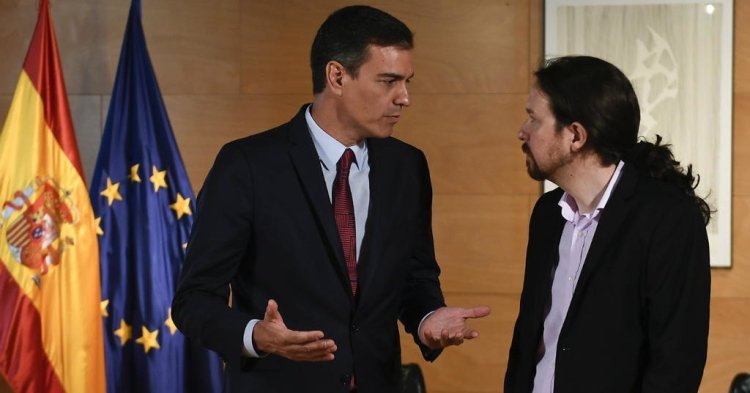To some, the breakdown of the PSOE-Podemos negotiations was inevitable before they had even begun. Strong differences on economic, foreign policy and territorial issues – most notably, the Catalan crisis – meant neither party really desired a coalition government with the other. From the night of the election, in fact, Sánchez had signaled his desire to form a minority administration – the so-called ‘Portuguese model’ – which would have allowed him to align himself with the Left on social issues and with centrist and conservative parties on economic and territorial issues. So much was implied in a recent letter to party members, in which he defended his actions throughout the past weeks and months. His wish, he claimed, was to form a new government agreement and to avoid a new election. On April 28th, however, Spaniards had voted for a Socialist government, and it was the duty of other parties to abstain in his investiture vote in order to facilitate its formation.
Yet in late July, as the vote loomed closer, public and media pressure piled on Sánchez, who opened up to a coalition government. One week before the crucial vote, he made what by many was seen as an impossible demand. He could agree to a coalition in principle, but only if Podemos leader Pablo Iglesias was not in the cabinet, – in order, as many have noted, to avoid the ‘Salvini effect’ of having a government within another government. Said demand backfired within hours, however, when Iglesias announced he would not demand such a role. This surprising move paved the way for a negotiation in which neither party fully trusted the other, and which thus broke down within days,
It has been speculated that, following the unsuccessful vote, both parties – but mainly PSOE – have made up their mind to call a second election, with some polls awarding Sánchez a staggering 41% of reported voted intention and some factions within Iglesias’ party hoping to capitalize from their leader’s act of political martyrdom. Said speculation has been fed by deputy prime minister Carmen Calvo, who earlier this week was adamant when asked whether PSOE intended to reopen coalition talks with Podemos: the latter’s abstention in the crucial vote precluded it, with PSOE now exploring “other avenues” – such as the abstention of the conservative People’s Party (PP – EPP) or Ciudadanos (Renew Europe) or a Portuguese-style minority government.
Yet if this were to be the case, and PSOE or Podemos were to be considering an early election, they would be running the risk of misreading the public mood. As has been widely analyzed, progressive parties’ victory in the April election was largely due to a high turnout, triggered by both fear of far-right party Vox (ECR) and an expectation of a progressive agreement following the election. Were Spain to head to the polls in November after the failure of such an agreement, the scenario would most likely be radically different.
On the one hand, Vox no longer seems as big a threat, having lost ground in the European election with voters’ return to the conservative People’s Party. More importantly, however, it would be naïve for progressive parties to expect as high a turnout. A recent poll by El País shows 71.6% of the electorate as a whole felt “anger, sadness or disappointment” at the failed investiture, with higher numbers for progressive voters. While 75.2% of the overall electorate blame Podemos for the failed vote, 48.3% of Sánchez’s own voters viewed him as “partly” or “largely” to blame for the outcome. Very indicatively, a mere 5% of Podemos and PSOE voters would support a new election.
A failure to reach what, only three months ago, seemed like an unavoidable outcome, would be a potentially career-ending blow for both Sánchez and Iglesias. For Podemos, it would most likely be the political death of a party which, ironically, started its decline precisely when, in 2016, it voted against a Sánchez-led government and paved the way for Rajoy’s second term. Sánchez, however, would the risk of faring no better: last week’s defeat weakened his political aura and alienated many left-leaning voters who fail to understand his repeated calls for an abstention from PP and Ciudadanos, both of which are locked in a fight for the de facto leadership of the opposition and thus unlikely to make concessions to the current administration. Said calls, which have been backed by the Financial Times and The Economist, are at best naïve: Ciudadanos’ recent regional agreements with Vox, their cordon sanitaire towards the socialists and an increasingly populist rhetoric are the latest examples of the extent towards which, as Manuel Valls recently highlighted, they have ceased to be the “keepers” of the “quintessentially European values” Renew Europe boasts of.
Sánchez’s defeat opens a period of uncertainty. Yet it is an uncertainty which can easily be avoided. It is necessary for PSOE and Podemos to take and step back, abandon short-term electoral analyses, and focus on the bigger picture. Both parties have an obligation to reach an agreement – imposing a further election on a disillusioned progressive electorate could carry the risk of an electoral triumph by a conservative coalition government featuring hard-right Vox (ECR). In under one year, Spain – the EU’s fifth economy – could transition from being the only major European country without a far-right parliamentary force, to having said party in government.
After eight years of austerity and four years of political instability, Spain needs a progressive government to undergo much needed reforms in a society marred by inequality – among others, a transition towards a green economy; a territorial reform which facilitates a way out of the Catalan crisis; employment legislation which firmly protects workers in an age of declining standards; a pensions system which works for an ageing population; and heavy investment in research and technological development to boost an economy still far too dependent on tourism.
Faced with an historic opportunity to shape the country’s fabric for the decades to come, PSOE and Podemos should not squander this opportunity – even if this requires making substantial concessions. Rather, they should seize it, by agreeing on a common set of policies and ensuring that, regardless of who makes up the future cabinet, they are delivered throughout the next four years. Failure to do so would not be a defeat solely for Podemos or of PSOE: it would be a defeat for progressives both across Spain and across Europe.


1. On 19 August 2019 at 19:49, by Alfilo de la Brecha Replying to: On PSOE, Podemos and squandered opportunities
Replying to: On PSOE, Podemos and squandered opportunities
I don´t agree at all with “On April 28th, however, Spaniards had voted for a Socialist government, and it was the duty of other parties to abstain in his investiture vote in order to facilitate its formation.” First, when other candidates tried to get invested and didnt have the votes, even Pedro Sanchez said that it was their job to get elected, it is not the duty of others to gift a govern to Sanchez but the duty of Sanchez to get elected. (As he said to Rajoy) https://twitter.com/Mhemeroteca/status/1154393431353020416 So if it is his duty to negociate, a progressive govern, i don´t get how first day of parlament he asked for the right abstence.. ¬¬ It is like Pedro didnt want a progressive govern. When he arrive to the govern was thanks to Podemos and the work to convince seccesionist forces to work agains spanish corruption. It was not easy, some of that forces prefered at first corruption so they get elected in their areas.. But Podemos did it. What Sanchez did? Name ministers like Maxim Huertas or Marlaska, it was an statement of how much progressive and clean Pedro want to govern. Pedro also tried to govern with Albert Rivera, he managed to silence that Rivera in the pact was going to get vicepresidence of spain. The real one not the fake one he offer Podemos. So insult after insult after insult Anyone that thinks that Podemos didnt make an effort deserve to get a Vox govern. People from the base of Podemos don´t trust Pedro Sanchez, (135, 155, Franco still at the glory tumb..didnt complete his promises about reforms ..) People want warrants so real space of govern. Pedro said Pablo was the problem. Pablo get out. Then they found other problems not to negotiate. PSOE want less this govern than Podemos, they want new elections. Never forget who to blame when vox come.
Follow the comments: |
|
